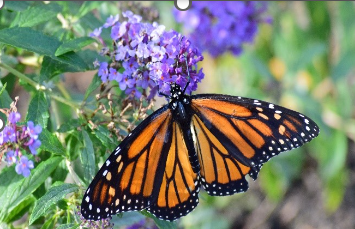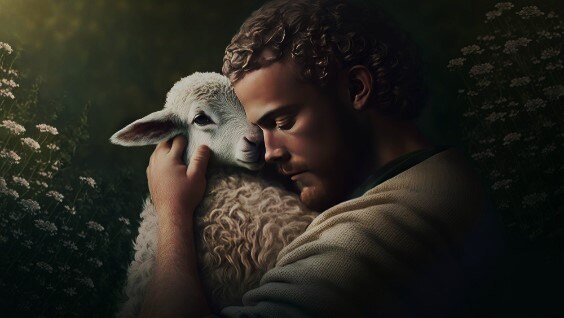A few summers ago, my husband John and I made some changes in how we cared for our yard. It started when I saw an advertisement for an organic lawn care program that did not use chemical pesticides, weed killers or fungicides. Instead, it used a variety of chemical-free methods to promote a healthy yard. Using fewer chemicals on our lawn seemed like a good idea for our health as well as the health of our dogs, so we signed up.
I wish I could say that our decision to stop using pesticides in our yard had something to do with wanting to embrace the biodiversity of our backyard and keep it as healthy as possible, but that would be giving us too much credit. In fact, after we signed on the dotted line and paid our money, we promptly forgot about it. But then as the summer wore on, one evening we noticed little dots of blinking lights. We had fireflies!
A Chemical-Free Yard
Sadly, it had been a few years since we had seen fireflies in our yard, which I’m sure had everything to do with the chemicals we had been using. But seeing how mother nature had rallied after treating her with a little more kindness, we excitedly continued to make our yard an open and affirming space to critters of all kinds.
John planted milkweed to attract monarch butterflies and started keeping leafcutter and mason bees to promote pollination. Our yard is now home to abundant vegetation, from butterfly bushes to vegetables to roses to dandelions–for without weed-killing chemicals, we have more weeds too!
And with five birdfeeders spread throughout our backyard, birds of all kinds visit and nest in our yard. But sharing our space with our flora and fauna friends isn’t always easy and even, at times, requires a bit of sacrifice. Two years ago, in late spring, we had three nests in the eaves of the awning covering our patio. Each nest was filled with tiny eggs that were diligently cared for by their busy parents.
Just as the warmer weather had the birds busy building nests and caring for their progeny to come, the warmer weather had also brought us out to prepare our patio for the summer. We looked forward to leisurely meals with friends, reading a book in our cozy wicker furniture, or simply sitting quietly to enjoy watching the hummingbirds lapping up nectar or monarch butterflies alighting on one of the flowers in our wildflower patch.
The first step in our patio prep was always cleaning the patio floor which was utterly filthy after the long winter and spring. Each year it required me to get down on my hands and knees to scrub. It is a backbreaking job. Ah, but that year was to be different; John was going to use our brand-new power-sprayer to clean our grimy patio floor. This meant no more hands or knees, no more scrubbing and no more back pain. I was thrilled and left John to take care of things.
We Have a Problem
However, it wasn’t long before John came in the house and announced, “We have a problem.” John explained that the power sprayer was so loud that the birds will likely leave and not come back, leaving their progeny to fend for themselves. John’s question was, “Should I continue?” And as I imagined myself on my hands and knees scrubbing that disgusting floor, my first thought was, ”I just can’t face scrubbing that floor.” Even more horrifying, my second thought was, “Oh well, the birds will just have to deal with it.”
Yes, in that moment, I was willing for John to clean our patio floor using the power sprayer. It would have surely disturbed the birds nesting in our awning to the point they would likely have abandoned their nests and the babies in them. You might think that I am exaggerating what my actual thoughts were at the time. But shamefully, I am not exaggerating. I was trying in any way possible to avoid the onerous task of scrubbing that patio floor, and I would justify it however I could.
My response made me think of the villain Cruella De Vil of the animated Disney movie “101 Dalmatians.” Unable to buy a litter of recently born dalmatian puppies, Cruella plans to kidnap the pups to ultimately kill them for their coats. When talking of killing the puppies Cruella bellows, ”Poison them! Drown them! Bash them in the head! I don’t care how you do it!”
I, however, had no plans to be like Cruella De Vil. I wanted our little birds to hatch and to thrive. I wanted to see them grow up to eat at our birdfeeders and bathe in our birdbath. Needless to say, the next day found me on my hands and knees scrubbing our patio floor.
Caring for Our Whole Planet
This reality is not only true in our tiny speck of a backyard but also for our entire planet. Do we want fireflies and monarch butterflies or not? What are we willing to do to create environments where baby birds can grow up and thrive? What are we willing to do to decrease carbon emissions, breathe clean air, drink clean water? Are we willing to be inconvenienced and put in the extra effort it will take to make that possible?
So far, it seems, we are not. I think that my little backyard bird story is a good example of how easily we can go down the road of pettiness and blithely throw those who are smaller and weaker under the bus. Or we can decide to put God’s creation first. But, as I found out, when you decide to put the health and well-being of God’s creation first–whether you are talking about each of us as individuals or all of us collectively—we must be willing to be flexible and change how things are done. It can take more work and time and cost more money.
The inconvenient truth is that, for us to have the thrill of seeing hundreds of blinking lights on a warm summer’s evening, or to marvel at the grace of a monarch butterfly, or to experience the fun of watching a fledgling learning to fly, we sometimes must get down on our hands and knees and scrub the patio floor.
For Reflection (either individually or with a group)
Read the blog. Read it a second time, maybe reading it aloud or asking someone else to read it aloud so you can hear it with different intonation and emphases. Invite the Divine to open your heart to allow the light of new understanding to pierce the shadows of embedded assumptions, stereotypes, and ways of thinking so that you may live more abundantly. Then spend some time with the following questions together with anything or anyone who helps you reflect more deeply.
- What is your favorite summertime memory/story?
- What makes that memory so special?
- Do any of your summertime memories connect to your understanding of caring for our planet? Why or why not?
View all articles by:






















